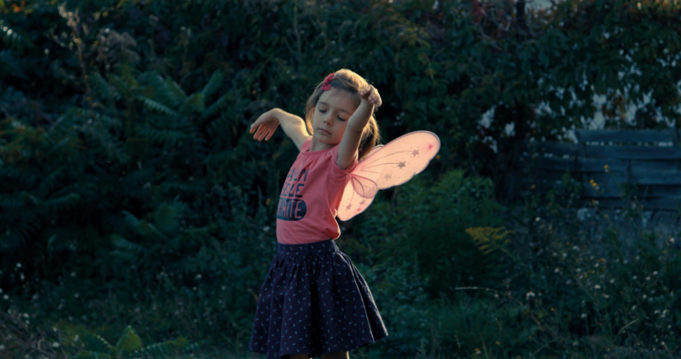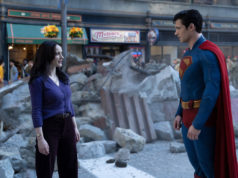Maybe this pandemic has encouraged more people to watch documentaries at home. What’s certain is that not enough of them have made it to the big screen. Even the Grand Berry Theater and the Modern Art Museum, reliable places to watch docs, left too many of the films here to streaming services. This New Year, let’s resolve to ask them and the big theater chains to give us more movies like these in 2022.
1.) Little Girl. Many fiction films imitate the techniques of documentaries, but not enough documentaries imitate the techniques of fiction films. That’s what Sébastien Lifshitz does for this narrative about Sasha Kovac, a 7-year-old who was born male but has always known herself to be a girl. The kid was lucky to be given a gender-neutral name at birth and luckier to have parents in the countryside outside Reims, France, who accept that she was born in the wrong body. Put together like a good drama, the film catches Sasha at a moment before the ignorant and cruel world will inevitably act on her, and it’s deeply moving.
2.) Procession. Robert Greene always takes an unorthodox route to his story, and so it is in this Netflix film. Rather than simply interview six Kansas City men who were raped as boys by Catholic priests, he has them all make their own short films about coping with the experience. As the victims help out on one another’s projects as actors or crew members, they bond together through their shared pain, learn the ins and outs of filmmaking, and walk through fire to achieve some sort of closure on their stolen innocence.
3.) Flee. This is much better than the movie version of The Kite Runner. Jonas Poher Rasmussen recounts the story of a gay man named Amin who fled his native Afghanistan when the Soviets invaded. While he settled in Denmark and found love, he kept the experiences on his journey secret even from his husband. The animation protects the identities of the people involved whose lives might be endangered otherwise, but it also contributes to the surreal, dreamlike odyssey of refugees as they leave their homelands and pass through unfamiliar territories to try to make a new home.
4.) Summer of Soul (… or When the Revolution Could Not Be Televised). Were you lucky enough to see this movie in the theaters? I was, and no home sound system could match the experience of being surrounded by music made by the artists at this 1969 festival that provided six days of concerts ranging from gospel (Mahalia Jackson) to blues (B.B. King) and from R&B (Stevie Wonder) to African music (Hugh Masekela). The footage languished in archives for half a century because distributors were more interested in the white people at Woodstock, but Questlove brought this celebration of Black music to rousing life.
5.) Music Box: Listening to Kenny G. When you’re a pop-culture punchline, you live in hell, one that no amount of money can pull you out of. Kenny G occupied that hell during the late 1980s well into the 1990s, and the now 65-year-old saxophonist seems to have handled all the hate from jazz purists and music fans amazingly well. Penny Lane’s film for HBO Max reveals surprising tidbits (a Chinese music theorist explains why Kenny G has a massive following in China), sits numerous hardcore jazz scholars down to make their peace with “Songbird” and “Silhouette,” and asks deep questions about what makes music good or bad. This documentary is comedy gold, and Kenny G is in on the joke.
6.) A Cop Movie. This Netflix film starts out as an ordinary movie about police officers in Mexico City, and then director Alonso Ruizpalacios goes several layers deeper by revealing that the cops we’re watching are actors portraying the real-life officers whose experiences make up the film. Then we follow actors Mónica del Carmen and Raúl Briones as they train with real cops in the D.F. while squaring their roles with their own less-than-friendly real-life experiences with police. This story about police corruption south of our border is more powerful for coming at the topic sideways.
7.) All Light, Everywhere. Theo Anthony goes deep inside the surveillance state with a bunch of video experts and manufacturers who joyfully predict a privacy-free, completely monitored world that sounds a lot like 1984. This film was made too early to point out that the scrutiny of cameras did nothing to keep Derek Chauvin from murdering George Floyd, but it does delve into the fatal flaw of this supposedly objective technology. True, the cameras themselves are unbiased. The trouble is, the people watching the video feed always have their own biases. Until we can correct those, there’s no trusting the tech.
8.) Wojnarowicz: Fuck You Faggot Fucker. The subtitle comes from a scrap of paper bearing that homophobic slur that David Wojnarowicz (pronounce that name voy-nah-row-vich) found on the sidewalk. He turned it into art by drawing two men having sex underneath the words. The movie chronicles the life of this New York street artist who was on the militant edge of the gay-rights movement during the AIDS epidemic that ultimately killed him. Chris McKim’s film details his life and becomes a battle cry for making trouble in the face of bigotry.
9.) Her Socialist Smile. Helen Keller has long been a secular saint in our culture, but this movie exposes just how controversial she was in her day. It wasn’t her advocacy for the disabled but rather her support of left-wing causes that made people burn her books. Today, she’d be alongside Alexandria Ocasio-Cortez on the political spectrum. John Gianvito could have unspooled this story in a conventional way. Instead, he uses strange, elliptical techniques to mirror the workings of a mind that even drifted left of the American Socialist Party in Keller’s fight for social and racial justice.
10.) Writing With Fire. It takes fearlessness to be a journalist, especially when you’re an Indian woman from the Dalit (untouchable) caste trying to break into a profession dominated by men from upper castes. Rintu Thomas and Sushmit Ghosh follow the all-female staff of Khabar Lahariya as they report on crimes in Uttar Pradesh that the police don’t care about. After seeing so many Indian movies gloss over the country’s myriad problems, it’s a great tonic to see these women tackle these issues head-on. The Indian people and government call them untouchable. I want to be like them when I grow up.
Honorable mention: Marilyn Agrelo’s Street Gang: How We Got to Sesame Street … Edgar Wright’s The Sparks Brothers … Hogir Hirori’s Sabaya … Elizabeth Chai Vasarhelyi and Jimmy Chin’s The Rescue … Wang Nanfu’s In the Same Breath … Matthew Heineman’s The First Wave … Jessica Beshir’s Faya Dayi … Sergei Loznitsa’s State Funeral … Joshua Rofé’s Bob Ross: Happy Accidents, Betrayal & Greed … Jason Pollock’s Finding Kendrick Johnson. l












